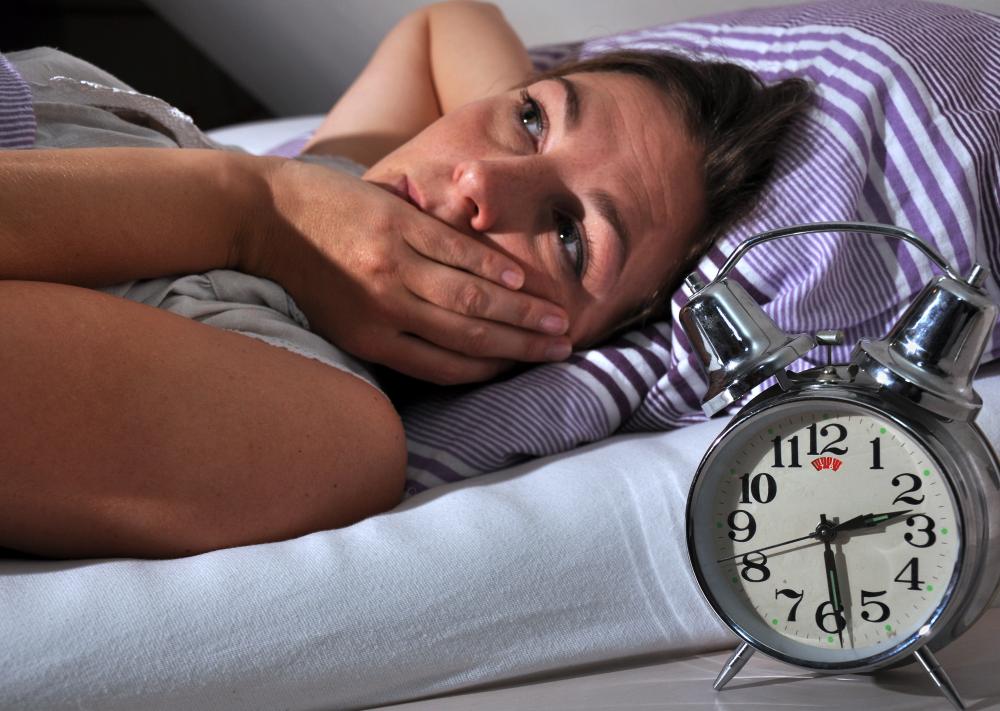At WiseGEEK, we're committed to delivering accurate, trustworthy information. Our expert-authored content is rigorously fact-checked and sourced from credible authorities. Discover how we uphold the highest standards in providing you with reliable knowledge.
What is Night Eating Syndrome?
Night eating syndrome is a disorder in which an individual consumes excessive amounts of food just before bedtime or in the middle of the night. Most people with the condition feel that they cannot sleep soundly unless they eat before going to bed. Some individuals, however, are highly unaware of their late night eating binges; they get up and visit the kitchen still in a sleeping state. Night eating syndrome can be caused by stress, hormone imbalances, genetic tendencies, or other underlying eating and mood disorders. An individual seeking treatment for the disorder should consult a physician to determine the most appropriate strategy for managing eating and sleeping habits.
People who suffer from night eating syndrome typically experience a number of symptoms. It is common for an individual to feel nauseous in the morning, skip breakfast, and eat lightly or irregularly throughout the day. Very few calories are consumed during the day, compelling him or her to compulsively eat snacks and meals throughout the evening and nighttime hours. Many individuals with the disorder frequently experience insomnia, especially when they are unable to eat as much as they would like before bedtime. Additional symptoms of anxiety, depression, and obesity are very common in people with night eating syndrome.

Many researchers and physicians believe that eating at night can be related to several different causes. Individuals on strict diets and those who are under excessive stress at work or home are likely to develop the condition. Imbalances of the hormones related to diet or sleep, including melatonin, leptin, and serotonin, can also contribute to eating binges at night. Clinical studies of individuals with night eating syndrome lead researchers to believe that sufferers may have legitimate food addictions, wherein they become obsessed to the point that they come to rely on night binges to sleep and function properly during the day.

Physicians, psychologists, and nutritionists can provide help to individuals with night eating syndrome. Hormonal supplements are usually recommended when chemical imbalances are determined to be the cause of eating and sleeping problems. An individual experiencing stress, anxiety, or depression may be prescribed medication to treat his or her underlying conditions, thus relieving night eating symptoms. Many patients benefit from behavioral therapy, individual counseling, and group therapy sessions, where they have the opportunity to discuss their struggles and learn techniques to help them manage their eating problems. Licensed nutritionists can help people design diet and exercise plans that promote healthy lifestyles and eating habits.
AS FEATURED ON:
AS FEATURED ON:














Discussion Comments
I heard Whoopi Goldberg tell a funny story about eating at night. She was on some kind of sleep medication and said she took her meds, went to sleep and woke up to her husband speaking to her. She said she was standing in her kitchen, in only her underwear, eating a frozen chocolate cake. She had never done that before, and knew it must have been the medication that caused it.
I wouldn't say I have night eating syndrome, but I am more apt to nibble at night, or decide I'm a little hungry and I'll eat half a peanut butter sandwich or something. I try to keep snack crackers around that have peanut butter in them so the protein will help level out my blood sugar. They're not calorie heavy and they satisfy my snack urge without completely blowing my diet.
Post your comments